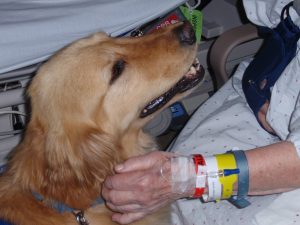As dog people, we know the meaningful impact dogs have in our lives. They make us laugh, they comfort us when we’re feeling blue, and they keep us engaged with the world. Our experience with the dogs we love is enough to prove that they’re good for our health. Thankfully, the world of science and medicine has caught on to the healing powers of man’s best friend. For cancer patients, time spent with dogs can have an incredible, lasting impact.
In hospitals and homes all over the world, therapy and service dogs are called on to provide companionship and assistance to people facing this disease. Dogs can help cancer patients cope through diagnosis, treatment, and beyond.
Emotional Support on Four Legs
Therapy dogs provide much-needed emotional support to cancer patients, who are vulnerable to depression and isolation as the disease impacts their lives. Spending time with a dog—petting its soft fur, talking without fear of judgment, and being on the receiving end of all that unconditional love—can help raise their spirits even while their body is feeling awful.
A study conducted with head and neck cancer patients at Beth Israel Medical Center in New York City found that although their physical well-being deteriorated during chemotherapy, patients who spent time with a therapy dog before each treatment reported an increase in their emotional and social well-being.
As self-proclaimed “cancer Ninja” Suleika Jaouad wrote in an essay about her experience adopting an assistance dog while in cancer treatment:
“Caring for a pet is a welcome distraction from the day-to-day reality of being a cancer patient.”
Having a dog to look after, feed, exercise, and love helps cancer patients divert their focus away from illness and onto something over which they have some control. For a sick person facing an uncertain future, that can mean the difference between giving up and moving forward.
In fact, one participant in the Beth Israel study said, “I would’ve stopped the treatment, but I wanted to see the dog.”
The Healing Effect of Dogs
While dogs can’t magically cure diseases, the impact they have on humans in need is immense. In recent years, more and more scientific evidence has backed up what dog people have always known: spending time with dogs is good for your health. In fact, caring for a pet has been proven to lower stress, encourage activity, and lift spirits.
For cancer patients, the healing qualities of dogs are immeasurable. Here are just a few of the important things dogs can provide to people with cancer:
- Relaxation. Spending time with an animal is soothing, and can be a vital respite in the course of a busy, often painful day.
- Safety. Dogs are great listeners, and cancer patients can talk to them about their fears (or choose not to talk and simply enjoy their company in quiet).
- Tactile sensation. Petting an animal releases endorphins, which reduces stress and improves mood.
- Distraction. Paying attention to a dog can help patients forget about their pain and frustration for a time, which invites healing and improved health.
- Socialization. Dogs invite conversation, and can help patients express themselves more freely to doctors and loved ones.
Service dogs lend a helping paw
While therapy dogs provide support to patients living with cancer, service dogs can be an integral part of recovery and independence for people whose cancer results in physical or psychological disabilities. For example, if a cancer patient has a limb amputated in the course of treatment, they may need assistance navigating the world with a wheelchair or prosthesis.According to the National Service Animal Registry, a service dog differs from an emotional therapy or support dog because it is “trained to perform major life tasks to assist people with physical or severe psychiatric impairments/disabilities.” Service dogs can be trained to:
- Assist in walking and prevent falls
- Turn lights and appliances on and off
- Carry groceries, bags, and packages
- Pick up items that are dropped or out of reach
- Bark for help and/or retrieve a phone
For a cancer survivor facing new challenges and abilities in the wake of their treatment, a service dog can provide help and encourage independence.
Where to Find Helper Dogs for Cancer Patients
- The Memorial Sloan Keating Cancer Center’s Caring Canines program has provided dog therapy to patients since 2007.
- Beth Israel Deaconess Medical Center in Massachusetts has an ongoing therapy dog program.
- At Siteman Cancer Center in St. Louis, the TOUCH (Therapy of Unique Canine Helpers) program provides weekly visits with therapy dogs.
- The Vanderbilt-Ingram Cancer Center in Nashville has a pet visitation program to bring companionship and levity to patients and their families.
- Cancer Treatment Centers of America provides animal assisted therapy from certified therapy dogs and their handlers at five centers nationwide.
- The AKC keeps a complete list of therapy dog programs in the U.S.
If your cancer diagnosis has resulted in permanent disability, you may qualify for a long-term assistance dog. Visit Service Dog Central for more information.
Help Your Dog Help People with Cancer
If your dog is calm, gentle, and well-behaved, she might be a good fit for therapy dog training. Being a therapy dog handler can be incredibly rewarding, as you’re helping your dog make a real difference in the lives of people in need. These are just a few resources to get you started:
- A Step-by-Step Guide to Becoming a Service Dog
- Therapy Dogs International
- Pet Partners
- The Good Dog Foundation
- Pet Partners
Of course, animal-assisted therapy may not be fore everyone. Some cancer patients have compromised immune systems, and exposure to a dog (plus all the stuff they can carry around on their coat, paws, and mouth) is not a good idea. Check out this list of things to consider before animal therapy, and be sure to consult with a medical professional before pursuing this or any course of treatment.
For cancer patients who qualify, dog therapy, assistance dogs, and even just time with a beloved family pet can have an incredible impact on mood and health. It’s something us dog people have always known: dogs improve our lives, and sometimes even save them.
The information provided in this article is not a substitute for professional veterinary help.



![IMG_0940[1]](https://www.rover.com/blog/wp-content/uploads/2015/07/cancer-smooch-300x300.jpg)



